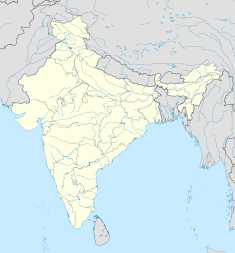Rumi Darwaza
| Rumi Darwaza रूमी दरवाजा رومی دروازه | |
|---|---|
 Rumi Darwaza in Lucknow | |
| Location | Lucknow, Uttar Pradesh, India |
| Coordinates | 26°51′38″N 80°54′57″E / 26.860556°N 80.915833°ECoordinates: 26°51′38″N 80°54′57″E / 26.860556°N 80.915833°E |
| Height | 18 m (60 ft) |
| Built | 1784 |
| Architectural style(s) | Mughal architecture |
 Location in eastern Uttar Pradesh, India | |
The Rumi Darwaza (Hindi: रूमी दरवाज़ा, Urdu: رومی دروازه, and sometimes known as the Turkish Gate), in Lucknow, Uttar Pradesh, India, is an imposing gateway which was built by Nawab Asaf-Ud-Daula in 1784.[1] It is an example of Awadhi architecture.[1] The Rumi Darwaza, which stands sixty feet tall,[2] was modeled (1784) after the Sublime Porte (Bab-iHümayun) in Istanbul.[3]
It is adjacent to the Asafi Imambara, in Lucknow and has become a logo for the city of Lucknow. It used to mark the entrance to Old Lucknow City, but as the City of Nawabs grew and expanded, it was later used as an entrance to a palace which was later demolished by the British Raj following the Indian Mutiny.
Etymology[]
It is believed that the gate was modelled after a historical gate in Constantinople. Rumi refers to Rûm, the historical name used by the Islamic world to denote the region roughly corresponding to Anatolia, or the dominion of the former Eastern Roman Empire. Therefore, "Rumi Darwaza" in Hindustani literally translates to "Turkish Gate" in English.[4]
Place[]
This massive gate is situated between Bara Imambara and Chota Imambara. This place is generally very much busy all day, and during weekends most of the tourists visit. The streets are redeveloped as it was earlier constructed of hard brick roadways.
Gallery[]




Rumi Darwaza

Rumi Darwaza at night

Rumi Darwaza view from Bara Imambara
See also[]
| Wikimedia Commons has media related to Rumi Darwaza. |
- Awadh
- Architecture of Lucknow
- List of gates in India
- Bara Imambara
- Chattar Manzil
- Imambara Shah Najaf
- Chota Imambara
- Imambara Ghufran Ma'ab
- Azadari in Lucknow
- Imambaras of Lucknow
References[]
- ^ a b "Rumi Darwaza - Lucknow". All India Tour Travel. Retrieved 21 May 2007.
- ^ "Rumi Darwaza - Rumi Darwaza Lucknow - Rumi Darwaja in Lucknow India".
- ^ "Lucknow". Encyclopædia Britannica. Retrieved 20 May 2008.
- ^ Singh, Shalini (1989). A Study in Cultural Expressions of the Nawabs of Avadh, Tourism Recreation Research, pp. 75-79. https://www.tandfonline.com/doi/abs/10.1080/02508281.1989.11014557
External links[]
- Buildings and structures in Lucknow
- Indo-Islamic architecture
- Tourist attractions in Lucknow
- Gates in India
- 1784 establishments in India
- Indian building and structure stubs










